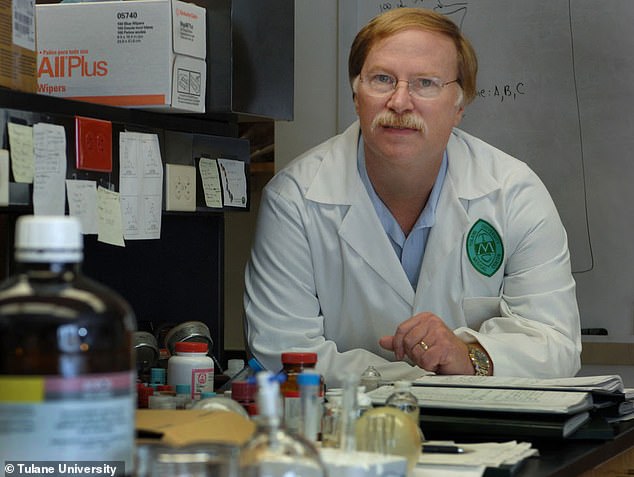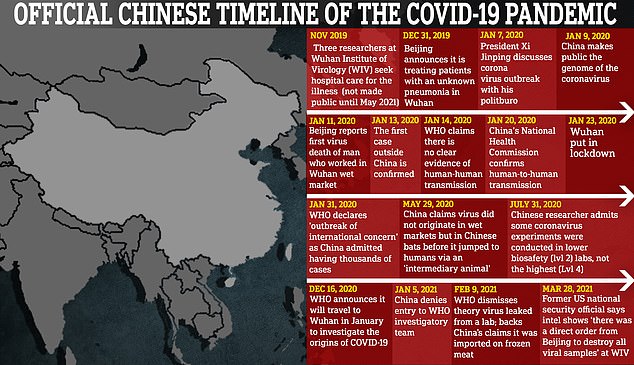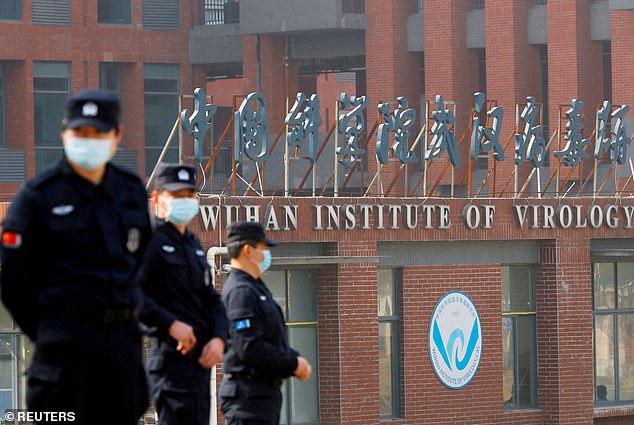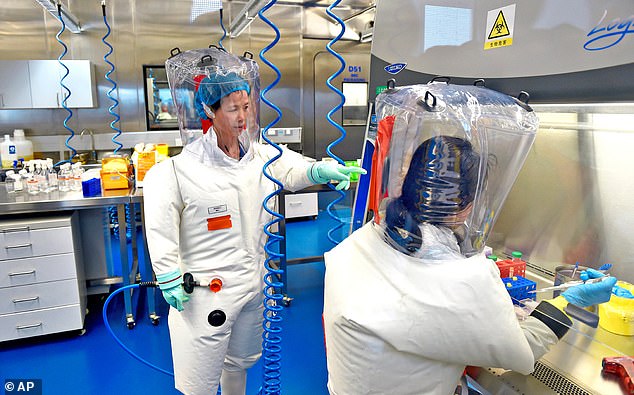Major Covid paper dismissing lab leak went ‘too far’, author says
Influential Covid origin paper which dismissed China lab leak as conspiracy theory went ‘too far’, claims one of the researchers
<!–
<!–
<!– <!–
<!–
(function (src, d, tag){ var s = d.createElement(tag), prev = d.getElementsByTagName(tag)[0]; s.src = src; prev.parentNode.insertBefore(s, prev); }(“https://www.dailymail.co.uk/static/gunther/1.17.0/async_bundle–.js”, document, “script”));
<!– DM.loadCSS(“https://www.dailymail.co.uk/static/gunther/gunther-2159/video_bundle–.css”);
<!–
One of the authors of an influential scientific paper credited with casting the Covid lab leak hypothesis as a fringe conspiracy theory has today admitted they went ‘too far’.
Professor Robert Garry, a respected microbiologist who works at Tulane University in New Orleans, is one of five bylined on a paper in March 2020 entitled ‘The Proximal Origin of Sars-Cov-2’.
This controversial paper has been accused of trying to shut down the idea that Covid might have leaked from a lab in Wuhan and had instead emerged naturally, crossing over from an animal.
The letter, published in the journal Nature Medicine, concluded: ‘We do not believe that any type of laboratory-based scenario is plausible.’
Now, Dr Garry has told the BBC this statement was never meant to dismiss all types of potential lab leak.

Speaking to Fever: The Hunt for Covid’s Origin, an eight-part BBC Radio 4 series, he said they were aiming to dismiss the idea the virus had been intentionally crafted as a bioweapon.
‘At that point we were still largely under the influence, when that particular sentence was written, with the notion that this may have been a bioengineered virus or maybe a weapon that just sort of accidentally released,’ he said.
But pressed by John Sudworth, the BBC’s former Beijing Correspondent, on how the paper’s principal conclusion covered all types of lab leaks, such as a from a disease research facility, Professor Garry admitted the wording was wrong.
‘Maybe we went a little too far there,’ he said.
His comments mark a shift in his opinion.
In March earlier this year, he said ‘no lab leak scenario’ was supported by data.
‘It is time to nail the coffin containing all the lab leak conspiracy theories shut and give this long dead corpse a proper burial,’ he said at the time.
He’s not the first author of ‘Proximal Origin’ to recently re-examine their influential paper’s conclusion.
Another, Professor Ian Lipkin, an epidemiologist based at Columbia University in New York, has also said he now has his doubts.
In another episode of Fever, he said that while he stands by the idea Covid was not deliberately created in a lab and a natural origin remained the most likely scenario, it wasn’t the only plausible one.
While most lab leak scenarios for Covid’s origins have centred on the Wuhan Institute of Virology (WIV), known to be working on coronaviruses found in bats, Professor Lipkin has a different hypothesis.
He pointed to another lab, the Wuhan Centre for Disease Control, located just a few hundred metres from Huanan market, where the first Covid cases were tracked, as one possible source.
This lab was known to be involved in the collection of thousands of blood and faecal samples from wild bats with staff who worked there not always wearing the recommended level of PPE while doing so.
Professor Lipkin said Covid could resultingly have ‘originated outside of the market and been amplified in the market’.
Another author of Proximal Origin is Dr Kristian Andersen, a Danish biologist from the Scripps Research Institute in La Jolla, California.


Emails between him and Dr Anthony Fauci, who headed the pandemic response in the US, discussing how the virus may have been engineered early in the pandemic, emerged later in 2021.
Dr Fauci has denied influencing the paper in anyway.
And Dr Garry said shutting down debate on a lab leak ‘never came into consideration’ during the writing of Proximal Origin.
The lab leak theory, once dismissed as an outright conspiracy, has gained increasing traction in the years since the virus first caused a global pandemic.
And just last week it was revealed that China’s own ‘bat woman’ Dr Shi Zhengli, a leading virologist based at the WIV, at one point feared Covid could have leaked from inside her secretive laboratory.
Other insiders at the heart of Beijing’s response to the pandemic have also admitted that the nation quietly investigated the possibility of the virus emerging from one of its labs.
Such investigations occurred despite President Xi Jinping’s communist administration repeatedly denying the hypothesis, labelling it a smear campaign by ‘anti-China’ forces and insisting the virus emerged naturally instead.
Back in 2020 the overwhelming opinion, shared by the world’s leading experts, was that Covid crossed naturally from animals infected with a bat coronavirus to humans.
But consensus over how the pandemic began three years ago has slowly started to shift.
Even some US intelligence officials have backed it, with FBI director Christopher Wray stating in February that the virus ‘most likely’ originated from a lab incident in Wuhan.
However, most experts maintain that Covid most likely emerged naturally, being transmitted from animals to humans – what is known as zoonosis.
Such theories have largely pointed to Wuhan’s Huanan seafood wholesale market, where numerous species of live animals were kept and sold, as the potential site where such an infection could have taken place.

And in February 2021, an investigation into Covid’s origin by the World Health Organization said it was ‘extremely unlikely’ the virus leaked from a lab.
But plans for a second phase of the investigation, involving audits of laboratories in the Wuhan area, were rejected by the Chinese government.
No concrete proof to support either argument has ever been found, leaving experts fearing the truth behind Covid’s origins will never be uncovered.
Beyond being just establishing a historical fact, experts also want to find how Covid emerged to help stop other similar pathogens becoming pandemics in the future.
This article has been archived for your research. The original version from Daily Mail can be found here.


